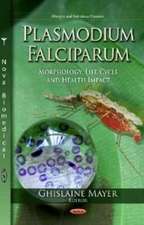New Trends in Allergy II
Editat de Johannes Ring Prefață de O. Braun-Falco Editat de Günter Burgen Limba Engleză Paperback – 16 noi 2011
Preț: 723.78 lei
Preț vechi: 761.87 lei
-5% Nou
Puncte Express: 1086
Preț estimativ în valută:
138.51€ • 150.40$ • 116.35£
138.51€ • 150.40$ • 116.35£
Carte tipărită la comandă
Livrare economică 23 aprilie-07 mai
Preluare comenzi: 021 569.72.76
Specificații
ISBN-13: 9783642713187
ISBN-10: 3642713181
Pagini: 388
Ilustrații: XXII, 362 p.
Dimensiuni: 170 x 244 x 20 mm
Greutate: 0.62 kg
Ediția:Softcover reprint of the original 1st ed. 1986
Editura: Springer Berlin, Heidelberg
Colecția Springer
Locul publicării:Berlin, Heidelberg, Germany
ISBN-10: 3642713181
Pagini: 388
Ilustrații: XXII, 362 p.
Dimensiuni: 170 x 244 x 20 mm
Greutate: 0.62 kg
Ediția:Softcover reprint of the original 1st ed. 1986
Editura: Springer Berlin, Heidelberg
Colecția Springer
Locul publicării:Berlin, Heidelberg, Germany
Public țintă
ResearchDescriere
Anergic reactions and anergic diseases are found in many fields of medicine. As wen as affecting the skin, allergic diseases occur in internal organs such as the lungs and the kidneys and in the vascular and nervous systems. Interdisciplinary understanding and cooperation thus seem necessary to get a better insight into allergic reactions in the different fields of medicine in order that we may give our patients the best diagnostic and therapeutic care. Allergic diseases are on the increase. Studies from Sweden show that 15% of the population there are atopic, and some people speculate that in Germany about 10%-15% of all adults suffer from one of the many different allergic conditions. We in our clinic also have the impression that the incidence of atopic reactions has increased in recent years. The figure of 15% would mean something like 200 000 people in Munich alone! We all know that a wide variety of environmental factors can induce allergic reactions in the skin, the respiratory system, or internal organs. The most important anergens in our environment are pollen, molds, animal dander, housedust mite, food or food additives, various insects, industrial compounds and drugs. The direct costs of hospital and community medical care, other services, and drugs to help patients with asthma, hay fever, and skin allergies have in creased considerably in the last 10 years. The figures should make it clear to everybody that we are dealing with a health and environmental problem of great practical importance.
Cuprins
Basic Immunology.- Biological Role of Major Transplantation Antigens in T Cell Self-recognition: Possible Consequences in Clinical Medicine.- Interleukins.- Immunoglobulin E.- Regulation of IgE by Lymphoid Cell-Derived Factors.- The IgE Receptor of Mast Cells and Basophils.- IgE Receptors on Lymphocytes.- IgE and Allergic Diseases.- Mediators.- Histamine and Allergic Diseases.- Lipid Mediators and Inflammation.- Lipoxygenase Activity in Cutaneous Inflammation.- Methods in Eicosanoid Determination.- Chemotactic Factors as Mediators of Allergy.- Complement-Derived Mediators: Induction of Vascular Changes and Cellular Triggering Reactions by Anaphylatoxins.- Paf-acether (Platelet-activating Factor).- Atopic Eczema and Food Allergy.- Itch and Endorphins.- Dry Skin (Sebostasis) and Inflammation: Heterogeneity of “Dry Skin” in Atopic Dermatitis.- Food Allergy and Atopic Eczema.- Intragastric Provocation under Endoscopic Control.- Allergy to Spices: Cross-reactivity to Other Allergens.- Glutamate-Induced Asthmatic Reactions.- Asthma.- Late Phase Reactions.- Aspirin-Induced and Intrinsic Asthma.- Isocyanate-Induced Asthma.- Contact Allergy.- Molecular Recognition in Allergic Contact Dermatitis.- Regulation of Contact Allergy by Interferon.- Contact-Allergy Time.- Drug Reactions.- Histopathological Patterns of Drug Eruptions.- Photosensitivity Due to Nonsteroidal Antiinflammatory Drugs.- Anaphylactoid Reactions to Mild Analgesics.- Immune Complex Anaphylaxis Induced by Dextran and Its Elimination by Hapten Inhibition.- Immunotherapy.- Standardization of Allergenic Extracts.- Allergen Extracts from Animals for Diagnosis and Immunotherapy.- Allergoids, Mechanisms and New Developments.- mPEG-Modified Allergen Preparations.- Pharmacotherapy.- Pharmacological Modulation of Immunoregulatory Lymphocyte Functions: The Adenosine Immunoregulatory System.- Superoxide Dismutase: Rationale of Therapeutic Use, Established Clinical Effects, and Perspectives.- Patterns of Theophylline Utilization.- Topical Steroids: Perspectives and Retrospectives.- Index of Authors.











